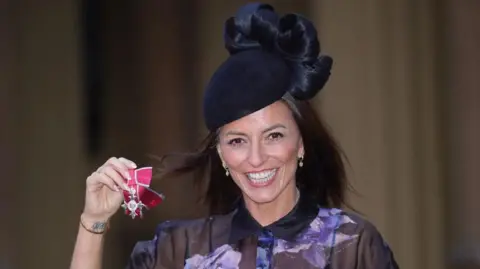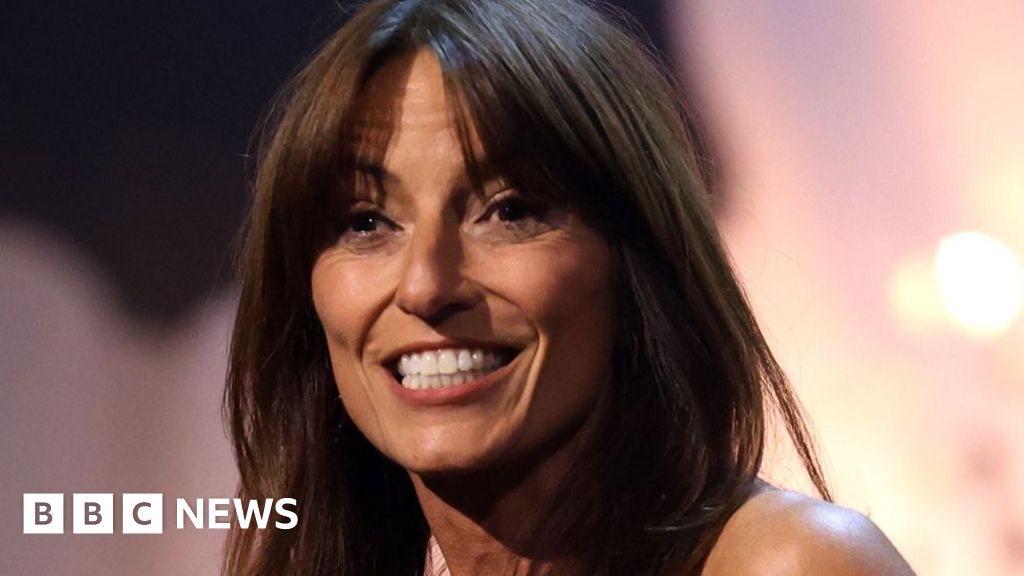 Getty Images
Getty ImagesDavina McCall is having surgery to remove a brain tumour, she has revealed.
The TV presenter, 57, posted a video on Instagram to say she had been diagnosed with a rare type of benign tumour called a colloid cyst.
A benign tumour is not cancerous, but such cysts tend to grow slowly, according to the Brainstrust charity.
“It needs to come out because if it grows, it would be bad,” McCall said, adding: “So say a prayer for me. I am in good spirits.”
In her video, she explained that the tumour had been found by chance.
“A few months ago, I did a menopause talk for a company and they offered me a health scan in return, which I thought I was going to ace,” she said.
“But it turned out I had a benign brain tumour called a colloid cyst, which is very rare – three in a million.
“And so I slightly put my head in the sand for a while, and then I saw quite a few neurosurgeons. I got lots of opinions, and I realised that I have to get it taken out.
“It’s big for the space. It fills the space. It’s 14mm wide, and it needs to come out because if it grows, it would be bad. So I’m having it removed via a craniotomy.”
A craniotomy is an operation where a surgeon removes part of the skull to take out the tumour.
“Get the cyst, empty it, take it out, Bob’s your uncle,” McCall said.
 Getty Images
Getty ImagesSpeaking alongside her partner Michael Douglas, she added: “I’m OK. It’s been up and down, obviously. We’ve been through a lot, yes.”
She said she expected to spend about nine days in hospital after the operation.
She told followers: “I don’t want you to worry about me. I’m doing that enough.
“But I’m not worrying too much and I am in a good space. I have all the faith in the world in my surgeon and his team, and I am handing the reins over to him.
“He knows what he’s doing, and I’m going to do the getting better bit after. I’ll see you on the other side.”
Douglas said he would temporarily take over her social media, and posted a message alongside her video on her Instagram account on Friday.
“Hey everyone. Michael here. @davinamccall will be ‘off grid’ for a bit while she recovers from this brain operation.
“She is in great shape and in very good hands. I’ll I do the odd update from her account here for anyone interested.
“I’m sure she’ll read all the comments when she’s able to so feel free to send love. The support of people is amazingly powerful. Have a great day everyone.”
What are colloid cysts?
They typically form in a fluid-filled cavity in the centre of the brain, and are themselves filled with fluid, the Brains Trust says.
They account for less than 2% of all primary brain tumours, and the rate of growth and symptoms can vary from person to person, according to the charity.
They are often found during a scan for something else, and some surgeons recommend a watch and wait policy if the cyst is small and causing no symptoms.
However, as they grow they can block the flow of cerebrospinal fluid (CSF), causing symptoms including headaches, vision problems, nausea and loss of consciousness. In extreme cases, without treatment they can cause coma and even sudden death.
‘We’re grateful to Davina’
The Brain Tumour Charity told BBC News: “All of us wish Davina the best possible outcome for this procedure.
“As an inspiration to so many, we’re grateful that she has chosen to raise awareness of this uniquely devastating disease.
“We are committed to funding pioneering research, campaigning for systemic change and offering support to all those whose lives are turned upside down by a brain tumour diagnosis.”
Will Jones, chief executive of Brainstrust, added: “Brain tumours are indiscriminate, they can affect anyone and they are more common than people might think. Over 80,000 people in the UK are living with a brain tumour, and there are over 130 different diagnoses.”
He added they were also “grateful to Davina” for sharing her story “openly and candidly”.
“This will help hundreds of people living with a colloid cyst to feel acknowledged and less alone,” he said.
 Getty Images
Getty ImagesMcCall’s long TV presenting career includes Channel 4’s Big Brother, ITV’s Long Lost Family, and My Mum, Your Dad, along with Comic and Sport Relief for the BBC.
Earlier this year she won a special recognition award at the National TV Awards, for her contributions to the TV industry over her career.
She also campaigns on menopause awareness, after her changing hormones prompted her to highlight women’s experiences with her work.
Last year she won the top prize at the British Book Awards for 2022’s Menopausing, which she co-wrote with Dr Naomi Potter.
The so-called “Davina effect” saw a huge increase in demand for hormone replacement therapy (HRT) after she made a Channel 4 documentary, Sex, Myths and Menopause, in 2021.




